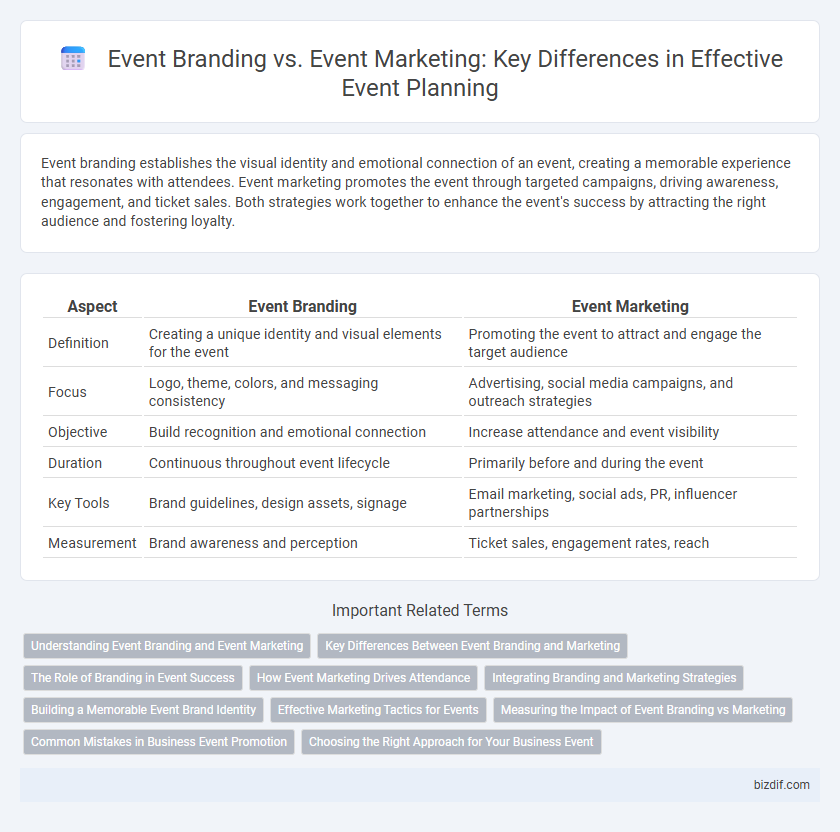Event branding establishes the visual identity and emotional connection of an event, creating a memorable experience that resonates with attendees. Event marketing promotes the event through targeted campaigns, driving awareness, engagement, and ticket sales. Both strategies work together to enhance the event's success by attracting the right audience and fostering loyalty.
Table of Comparison
| Aspect | Event Branding | Event Marketing |
|---|---|---|
| Definition | Creating a unique identity and visual elements for the event | Promoting the event to attract and engage the target audience |
| Focus | Logo, theme, colors, and messaging consistency | Advertising, social media campaigns, and outreach strategies |
| Objective | Build recognition and emotional connection | Increase attendance and event visibility |
| Duration | Continuous throughout event lifecycle | Primarily before and during the event |
| Key Tools | Brand guidelines, design assets, signage | Email marketing, social ads, PR, influencer partnerships |
| Measurement | Brand awareness and perception | Ticket sales, engagement rates, reach |
Understanding Event Branding and Event Marketing
Event branding involves creating a unique visual identity and emotional appeal for an event, including logos, color schemes, and messaging that reflect the event's core values. Event marketing focuses on promoting the event to a target audience through strategies such as social media campaigns, email marketing, and advertising to increase attendance and engagement. Understanding the distinction enables planners to build strong brand recognition while driving effective outreach and ticket sales.
Key Differences Between Event Branding and Marketing
Event branding establishes the unique identity, logo, color scheme, and overall visual style of an event to create lasting recognition and emotional connection with the audience. Event marketing involves strategic promotion, advertising, and communication efforts designed to drive attendance, engagement, and sales for the event. The key difference lies in branding shaping perception and loyalty, while marketing focuses on outreach and conversion.
The Role of Branding in Event Success
Event branding establishes a memorable identity that distinguishes an event in a competitive market, enhancing attendee recognition and loyalty. Effective branding communicates the event's core values and themes, creating an emotional connection that encourages engagement and repeat attendance. This strategic differentiation directly contributes to overall event success by boosting visibility, driving ticket sales, and attracting sponsors.
How Event Marketing Drives Attendance
Event marketing drives attendance by strategically promoting event value through targeted campaigns across multiple channels, including social media, email, and paid advertising. It utilizes audience insights and analytics to optimize message delivery, ensuring higher engagement and conversion rates. Unlike event branding, which establishes the event's identity and aesthetic, event marketing actively attracts and motivates potential attendees to participate.
Integrating Branding and Marketing Strategies
Integrating event branding and event marketing strategies maximizes audience engagement by creating a consistent message across all promotional channels and on-site experiences. Strong event branding establishes a recognizable identity that resonates with the target audience, while event marketing leverages this identity through targeted campaigns, social media outreach, and influencer partnerships. Seamlessly aligning branding elements like logos, themes, and messaging with marketing tactics ensures higher attendance rates and improved return on investment for event planners.
Building a Memorable Event Brand Identity
Event branding focuses on creating a unique and consistent identity through logos, color schemes, and messaging that resonate with the target audience, ensuring lasting recognition and emotional connection. Event marketing involves strategic promotion techniques such as social media campaigns, email marketing, and influencer partnerships to drive attendance and engagement. Building a memorable event brand identity enhances overall event perception, increases loyalty, and differentiates the event in a competitive market.
Effective Marketing Tactics for Events
Effective event marketing tactics include targeted social media campaigns, email marketing, and influencer partnerships to increase attendance and engagement. Event branding focuses on creating a cohesive visual identity that reflects the event's theme and values, enhancing recognition and loyalty. Combining strong branding with strategic marketing drives higher event visibility and measurable ROI.
Measuring the Impact of Event Branding vs Marketing
Measuring the impact of event branding involves evaluating brand recognition, recall, and emotional connection using metrics like brand surveys and social media engagement. In contrast, event marketing impact is assessed through lead generation, ticket sales, conversion rates, and return on investment (ROI). Both approaches require data-driven analysis, but branding focuses on long-term brand equity while marketing emphasizes immediate business outcomes.
Common Mistakes in Business Event Promotion
Confusing event branding with event marketing often leads to inconsistent messaging and unclear audience targeting, reducing overall event impact. Neglecting the distinct roles of branding--establishing event identity and emotional connection--and marketing--driving attendance through strategic promotion--results in ineffective campaigns. Businesses frequently underestimate the importance of cohesive visuals and messaging, causing diluted brand recognition and lower participant engagement.
Choosing the Right Approach for Your Business Event
Event branding establishes the unique identity and emotional connection of your event through visuals, themes, and messaging that resonate with your target audience. Event marketing focuses on promoting the event to drive attendance and engagement using strategic channels like social media, email campaigns, and influencer partnerships. Choosing the right approach depends on your event goals, whether prioritizing long-term brand loyalty through consistent brand experience or maximizing immediate reach and conversions.
Event branding vs event marketing Infographic

 bizdif.com
bizdif.com